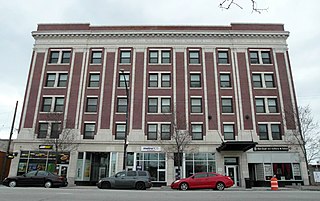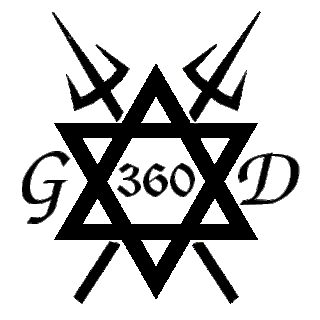Related Research Articles

The Aryan Brotherhood is a neo-Nazi prison gang and an organized crime syndicate that is based in the United States and has an estimated 15,000–20,000 members both inside and outside prisons. The Southern Poverty Law Center (SPLC) has characterized it as "the nation's oldest major white supremacist prison gang and a national crime syndicate" while the Anti-Defamation League calls it the "oldest and most notorious racist prison gang in the United States". According to the Federal Bureau of Investigation (FBI), the Aryan Brotherhood makes up an extremely low percentage of the entire US prison population, but it is responsible for a disproportionately large number of prison murders.

Woodlawn, on the South Side of Chicago, Illinois, is one of Chicago's 77 community areas. It is bounded by Lake Michigan to the east, 60th Street to the north, Martin Luther King Drive to the west, and 67th Street to the south. Both Hyde Park Career Academy and the all-boys Catholic Mount Carmel High School are in this neighborhood; much of its eastern portion is occupied by Jackson Park. The Woodlawn section of the park includes the site of the planned Obama Presidential Center, an estimated $500 million investment. The northern edge of Woodlawn contains a portion of the campus of the University of Chicago.

The Almighty Latin King and Queen Nation is one of the largest Caribbean and Latino street and prison gangs worldwide. The gang was founded by Puerto Ricans in Chicago, Illinois, in 1954.

The Gangster Disciple Nation, also known as Growth & Development, is an African American street and prison gang which was formed in 1968 by Larry Hoover and David Barksdale. The two rival gangsters united together to form the Black Gangster Disciple Nation (BGDN). Since 1989, after a decline in leadership caused friction between the two gangs, the BGDN has divided into different factions known today as the Gangster Disciple Nation and the other being the Black Disciple Nation.

The Moorish Science Temple of America is an American national and religious organization founded by Noble Drew Ali in the early 20th century. He based it on the premise that African Americans are descendants of the Moabites and thus are "Moorish" by nationality, and Islamic by faith. Ali put together elements of major traditions to develop a message of personal transformation through historical education, racial pride, and spiritual uplift. His doctrine was also intended to provide African Americans with a sense of identity in the world and to promote civic involvement.

Oakland, located on the South Side of Chicago, Illinois, USA, is one of 77 officially designated Chicago community areas. Bordered by 35th and 43rd Streets, Cottage Grove Avenue and Lake Shore Drive, The Oakland area was constructed between 1872 and 1905. Some of Chicago's great old homes may be seen on Drexel Boulevard. The late 19th-century Monument Baptist Church on Oakwood Blvd. is modeled after Boston's Trinity Church. Oakwood /41st Street Beach in Burnham Park is at 4100 S. Lake Shore Drive. With an area of only 0.6 sq mi Oakland is the smallest community area by area in Chicago.

The United States Penitentiary, Administrative Maximum Facility, commonly known as ADX Florence or the Florence Supermax, is an American federal prison in Fremont County to the south of Florence, Colorado, operated by the Federal Bureau of Prisons, a division of the United States Department of Justice. ADX Florence, constructed in 1994 and opened one year later, is classed as a supermax or "control unit" prison, that provides a higher, more controlled level of custody than a regular maximum security prison. ADX Florence forms part of the Federal Correctional Complex, Florence, which is situated on 49 acres of land and houses different facilities with varying degrees of security, including the adjacent United States Penitentiary, Florence High.

Larry Hoover is an American former gangster and street gang kingpin. He is the founder of the Chicago street gang, the Gangster Disciples.
The Almighty Black P. Stone Nation is an American street gang founded in Chicago. The gang was originally formed in the late 1950s as the Blackstone Rangers. The organization was co-founded by Eugene Hairston and Jeff Fort. In later years, under Fort's leadership, an Islamic faction of the gang emerged, naming themselves the "El Rukn tribe of the Moorish Science Temple of America" . They eventually started describing themselves as Orthodox Sunni Muslims. Jeff Fort changed their fort name from El Rukn Moorish Science Mosque, to El Rukn Sunni Masjid al-Malik.
The Mickey Cobras are a gang affiliated with the nationwide alliance known as "People" and based in Chicago. The gang is considered stable, and its colors are green, black, and red. Factions of the gang are being established throughout the Midwest.
The Black Disciples is a large street gang based in Chicago, Illinois.

The Diablos Motorcycle Club is an outlaw motorcycle club founded in San Bernardino, California in 1961 that has chapters in cities across the United States.

Approximately 1.4 million people in the United States were part of gangs as of 2011, and more than 33,000 gangs were active in the country. These include national street gangs, local street gangs, prison gangs, outlaw motorcycle clubs, and ethnic and organized crime gangs.
People Nation is an alliance of street gangs generally associated with the Chicago area. They are rivals of the Folk Nation alliance of gangs.

David Barksdale, also known as King Dave, was an American gangster and activist from Chicago, Illinois. Barksdale was the founder of the Black Disciples. He and Larry Hoover decided to merge and create the Black Gangster Disciple Nation. He was seen as a hero in the black community because he operated a free breakfast program in Englewood to poor children, and he and the Disciples marched with Martin Luther King Jr. in Marquette Park. He was a close friend of Fred Hampton. Barksdale died on September 2, 1974, due to kidney failure, at the age of 27.
The United Blood Nation, also known as the East Coast Bloods, is a street and prison gang active primarily in the New York metropolitan area. It is the east coast faction of the California-based Bloods street gang. Their main source of income is the trafficking and sale of illegal drugs.

Michael Sarno is an American mobster who has been identified as the alleged, current leader of the Cicero street crew in the Chicago Outfit criminal organization. On February 8, 2012, Sarno was sentenced to 25 years in prison on racketeering charges.
The Continuing Criminal Enterprise Statute is a United States federal law that targets large-scale drug traffickers who are responsible for long-term and elaborate drug conspiracies. Unlike the RICO Act, which covers a wide range of organized crime enterprises, the CCE statute covers only major narcotics organizations. CCE is codified as Chapter 13 of Title 21 of the United States Code, 21 U.S.C. § 848. The statute makes it a federal crime to commit or conspire to commit a continuing series of felony violations of the Comprehensive Drug Abuse Prevention and Control Act of 1970 when such acts are taken in concert with five or more other persons. For conviction under the statute, the offender must have been an organizer, manager, or supervisor of the continuing operation and have obtained substantial income or resources from the drug violations.
Thomas J. Maloney (1925–2008) was a judge in Cook County, Illinois who served from 1977 until his indictment for bribery in 1991. Since 1981, the court was being investigated by the FBI in Operation Greylord, and he was eventually convicted on four counts of accepting bribes. He served 12 years of a 15-year prison term from 1994 to 2007.
Barrio Azteca, or Los Aztecas, is a Mexican-American street and prison gang originally based in El Paso, Texas, USA and Ciudad Juarez, Chihuahua, Mexico. The gang was formed in the Coffield Unit, located near Tennessee Colony, Texas by Jose "Raulio" Rivera, a prisoner from El Paso, in the early 1980s. It expanded into a transnational criminal organization that traded mainly across the US-Mexico border. Currently one of the most violent gangs in the United States, they are said to have over 3,000 members across the country in locations such as New Mexico, Texas, Massachusetts, and Pennsylvania as well as at least 5,000 members in Ciudad Juarez, Mexico.
References
- 1 2 3 4 Austin, Curtis J. (2006). Up against the wall: violence in the making and unmaking of the Black Panther Party. University of Arkansas Press. p. 199. ISBN 1-55728-827-5.
- 1 2 "At one point, now-notorious Chicago gang leader Jeff Fort’s future looked bright", chicagomag.com; accessed July 15, 2020.
- ↑ White, Deborah Gray; Bay, Mia; Waldo e. Martin, Jr (9 September 2016). Freedom on My Mind: A History of African Americans, with Documents. Bedford/St. Martin's. ISBN 9781319021337.
- 1 2 3 Schatzberg, Rufus; Robert J. Kelly (1987). African American Organized Crime: A Social History. Rutgers University Press. pp. 199–202. ISBN 0-8135-2445-8.
- 1 2 3 McPherson, James A. (May 1969). "Chicago's Blackstone Rangers". Atlantic Monthly . Retrieved 2008-02-10.
- 1 2 "Inmate Locator". bop.gov. Archived from the original on 2019-12-17. Retrieved 2008-01-30.
- ↑ "Rukn Boss's Order To Hit Son Is Told", Chicago Tribune, June 18, 1991.
- ↑ Body Pulled From Wolf Lake Is Jeff Fort's Son, Chicago Tribune, March 29, 1997.
- ↑ White, D.G.; Bay, M.; Martin, W.E. (2016). Freedom on My Mind: A History of African Americans, with Documents. Bedford/St. Martin's. ISBN 978-1-319-02133-7 . Retrieved 2020-07-15.
- ↑ Jeff Fort Archived 2016-03-03 at the Wayback Machine , biography.com; accessed July 15, 2020.
- 1 2 "Five Draw Long Sentences for Terrorism Scheme". The New York Times. 1987-12-31. Retrieved 2007-12-21.
- ↑ Family of ex-gang leader "Jeff Fort sues PBS", chicagotribune.com, August 11, 2010; retrieved March 12, 2020.
- ↑ "Family Says PBS Crew Intruded on Funeral", August 13, 2010; retrieved March 12, 2020.
- 1 2 3 4 5 Harris, Donnie (2004). "Black Peace Stone Nation". Gangland. Holy Fire Publishing. pp. 71–72. ISBN 0-9761112-4-1.
- ↑ Jacobs, James B. (1978). Grassroots Independent Voters of Illinois. University of Chicago Press. pp. 140–42. ISBN 0-226-38977-4 . Retrieved July 15, 2020.
- ↑ Timmerman, Kenneth. Shakedown: Exposing the Real Jesse Jackson (2002).
- ↑ McPherson, James A. (June 1969). "Chicago's Blackstone Rangers (II)". Atlantic Monthly. Retrieved 2008-02-10.
- ↑ The Blackstone Rangers, uic.edu; accessed July 15, 2020.
- ↑ "The Almighty Black P Stone Nation", books.google.com; accessed July 15, 2020.
- 1 2 Schmidt, William E. (1987-11-05). "Chicago Journal; U.S. Squares Off Against Tough Gang". The New York Times. Retrieved 2007-12-29.
- 1 2 3 4 Don Terry (1991-05-19). "In Chicago Courtroom, Nation's First Super Gang Fights for Life". The New York Times. Retrieved 2007-12-28.
- ↑ Rossi, Rosalind (1992-08-24). "How the Law Won War With El Rukns". Chicago Sun-Times .
Jeff Fort, serving 155 years at the federal prison in Downstate Marion
- ↑ "GANG CHIEF GUILTY IN RIVAL'S SLAYING". The New York Times. 1988-10-20. Retrieved 2007-12-21.
- ↑ Rossi, Rosalind (1988-11-15). "75 more years for Fort 4 other Rukns draw stiff terms". Chicago Sun-Times. p. 3.
- ↑ "Crime Elite Moving To Rockies 'Alcatraz'". The Washington Post. 1994-12-27.
- ↑ Khan, Azmat (2012-02-14). "Meet The Interrupters". FRONTLINE. Retrieved 2020-03-01.